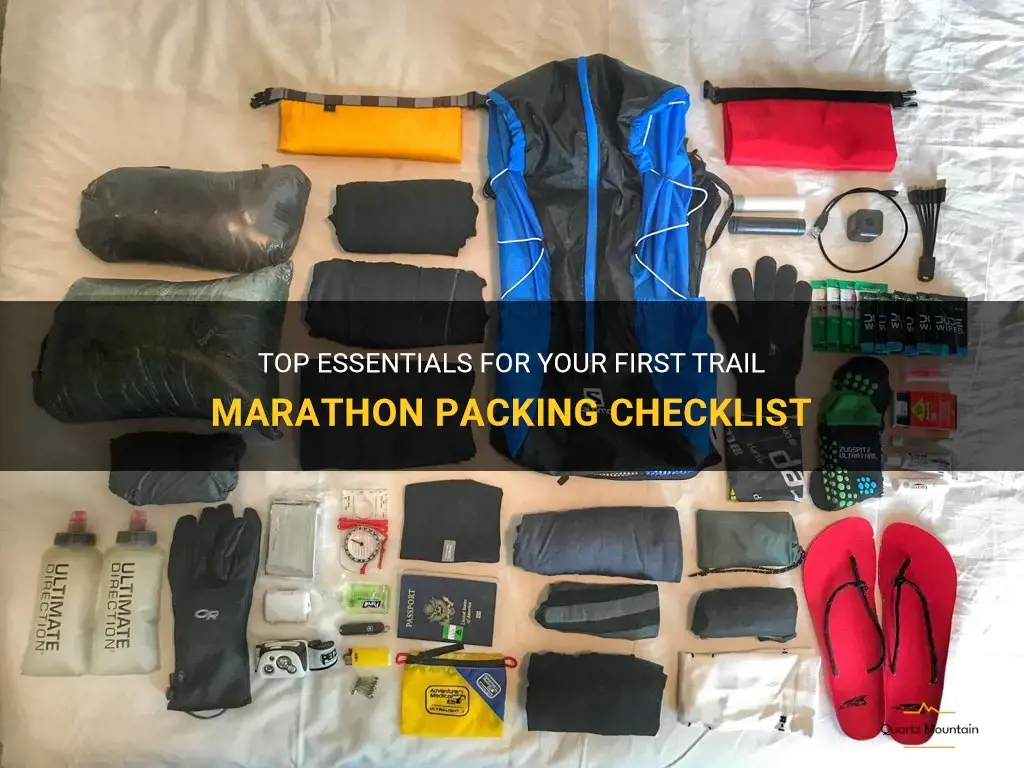
Are you preparing for your first trail marathon? If so, you'll need to make sure you have all the essential items packed and ready to go. From proper running shoes to hydration packs, a trail marathon requires different gear than a regular road race. In this article, we'll cover the top essentials for your first trail marathon packing checklist, so you can feel confident and prepared on race day. Don't let the excitement of the race overshadow the importance of being well-equipped.
What You'll Learn
- What are the essential items to pack for a trail marathon?
- Are there any specific clothing or gear requirements for a trail marathon?
- What kind of food and hydration should I pack for a trail marathon?
- Are there any safety items or equipment that should be included in the packing list for a trail marathon?
- Are there any optional items that could enhance the experience of running a trail marathon and should be considered when packing?

What are the essential items to pack for a trail marathon?
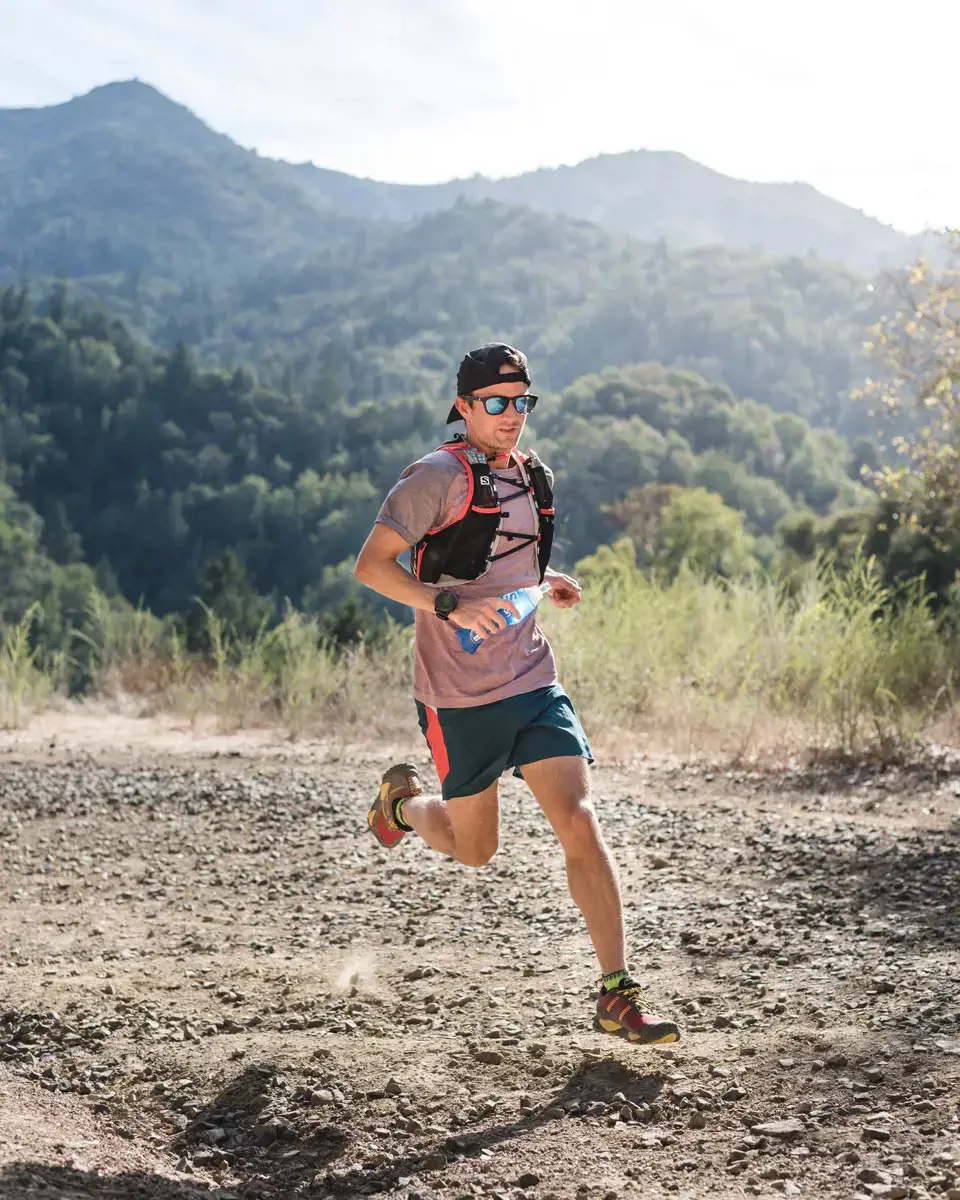
Trail marathons are a thrilling adventure that combines the love for running with the beauty of nature. Whether you are a seasoned trail runner or a beginner looking to challenge yourself, packing the right essentials is crucial for a successful and enjoyable race. In this article, we will explore the essential items to pack for a trail marathon, ensuring that you have everything you need for a safe and prepared experience.
Trail Running Shoes:
Choosing the right pair of trail running shoes is paramount for a trail marathon. Unlike road running shoes, trail running shoes are designed to provide more stability and traction on uneven terrain. Look for shoes with a durable and grippy outsole, supportive cushioning, and a protective toe cap. It is important to break in your shoes before the race to avoid discomfort and blisters.
Hydration Pack or Vest:
Staying hydrated during a trail marathon is crucial as the terrain can be challenging, and water stations may be limited. Invest in a hydration pack or vest that allows you to carry water, electrolytes, and energy gels conveniently. Look for packs with adjustable straps and multiple pockets to carry your essentials.
Nutrition and Energy Gels:
Fueling your body properly during a trail marathon is essential for maintaining energy and stamina. Pack energy gels, bars, and snacks that are easy to consume on the go. Look for options that provide a mix of carbohydrates, protein, and electrolytes to keep your energy levels balanced and replenished.
Trail Map and Navigation Tools:
Trails can be complex and it's easy to get lost during a marathon. Always carry a trail map, compass, or GPS device to help you navigate through the course. Familiarize yourself with the trail beforehand and mark any potential landmarks or turns to minimize the chances of getting lost.
Weather-appropriate Clothing:
Weather conditions can vary during a trail marathon, so it's crucial to pack clothing for different scenarios. Consider the temperature, terrain, and potential weather changes when selecting your clothing. Opt for moisture-wicking and breathable materials that will keep you comfortable and dry. Pack a lightweight and waterproof jacket, hat, gloves, and extra layers in case of unexpected weather changes.
First Aid Kit:
Injuries can happen during a trail marathon, so it's essential to carry a small first aid kit. Include essentials like band-aids, blister pads, antiseptic wipes, tweezers, and pain relief medication. Familiarize yourself with basic first aid techniques to handle minor injuries.
Sun Protection:
Trail marathons often take place in open and exposed areas, increasing your exposure to the sun. Pack sunscreen with a high SPF, a hat, sunglasses, and lip balm with SPF to protect your skin from harmful UV rays.
Trail-friendly Phone and Portable Charger:
Carry a fully charged phone with a reliable GPS app or navigation tool in case of emergencies or navigation difficulties. Additionally, bring a portable charger to ensure that your phone stays charged throughout the race.
Emergency Whistle and Signal Mirror:
In case of emergencies or if you need to attract attention, carry an emergency whistle and a signal mirror. These simple tools can be life-saving in situations where you need to signal for help.
Positive Mindset and Determination:
While not a physical item, having a positive mindset and determination are essential for a trail marathon. Mental strength plays a significant role in overcoming challenges on the trail. Stay focused, embrace the beauty of nature, and remember why you signed up for the race in the first place.
In conclusion, preparing for a trail marathon requires careful consideration of the essential items to pack. From proper trail running shoes to navigation tools and hydration packs, each item plays a crucial role in ensuring a safe and enjoyable race. By packing these items and maintaining a positive mindset, you will be well-prepared for the adventure that awaits you on the trails.
Essential Items to Pack for an Unforgettable Colombia Adventure
You may want to see also

Are there any specific clothing or gear requirements for a trail marathon?
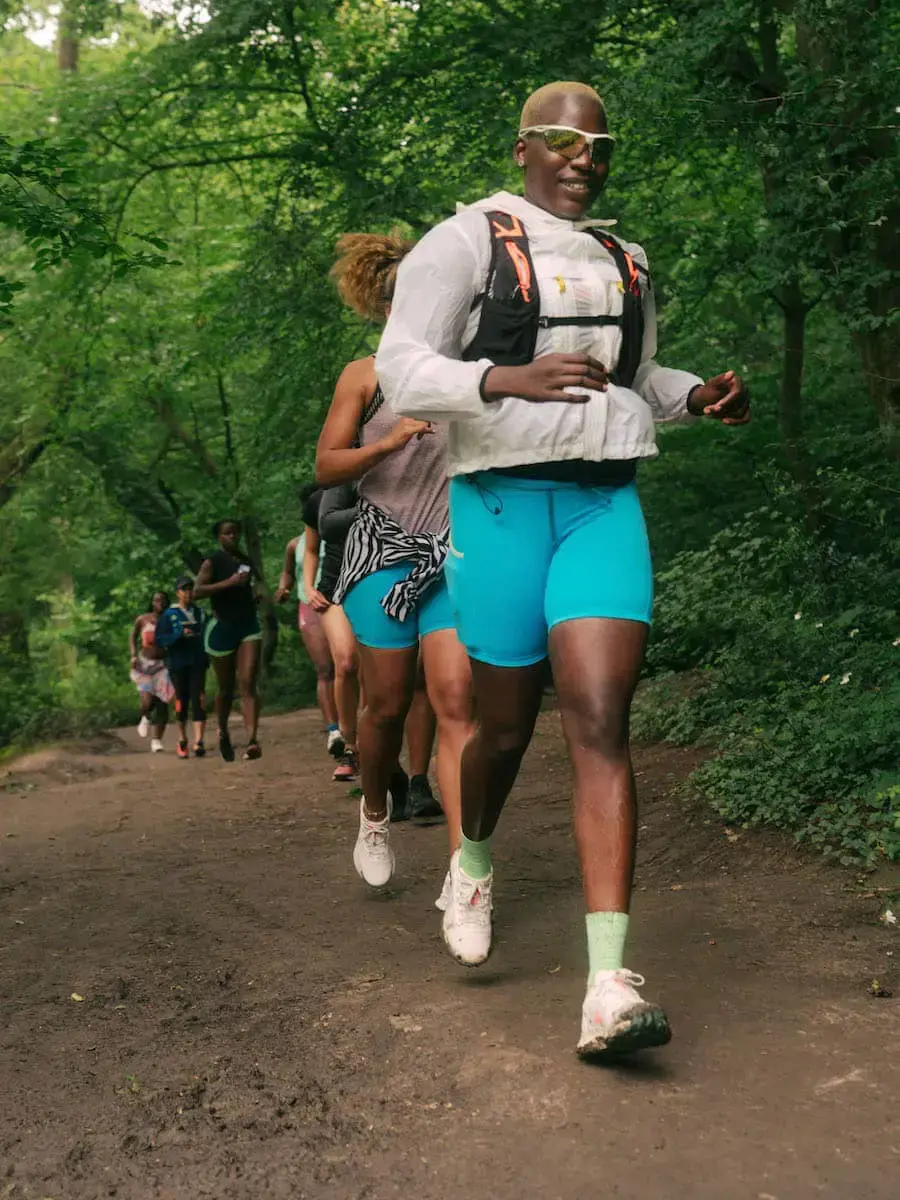
Running a marathon is no easy feat, and running a trail marathon adds its own set of challenges. In addition to the physical and mental preparations needed, it is essential to have the right clothing and gear to ensure a successful and comfortable race.
When it comes to clothing for a trail marathon, it is crucial to prioritize comfort and functionality. Here are some recommendations to consider:
- Moisture-wicking and breathable fabrics: Opt for clothing made from materials like polyester or nylon that wick away sweat and allow for proper ventilation. This will help keep you dry and cool throughout the race.
- Compression gear: Compression socks, shorts, or tights can provide support to your muscles and help improve circulation. They can also reduce muscle fatigue and help speed up recovery. Consider wearing compression gear, especially if you have a history of muscle strains or fatigue during long-distance runs.
- Proper footwear: Trail shoes are a must for a trail marathon. These shoes have a more rugged outsole and provide greater stability and traction on uneven terrain. Look for shoes that offer good ankle support and have a protective toe cap to guard against rocks and debris. It is essential to break in your shoes before the race to prevent blisters or discomfort during the marathon.
- Layers: Dressing in layers is crucial when running a trail marathon, as weather conditions can change throughout the race. Wear a lightweight base layer that wicks away sweat, followed by a mid-layer for insulation, and a waterproof or windproof outer shell for protection against the elements. This way, you can add or remove layers as needed during the race.
- Headgear and sunglasses: A hat or visor can help keep the sun out of your eyes and provide some shade. Sunglasses with UV protection are also essential to protect your eyes from the sun's glare and to keep debris out.
- Hydration pack or waist belt: Since trail marathons often take runners through remote areas, it is crucial to carry enough water and fuel. Consider using a hydration pack or a waist belt with pockets to store energy gels, snacks, and extra hydration. Make sure to test and get used to using these accessories during your training runs.
Additionally, there are some other gear considerations that are essential for a trail marathon:
- Trail map and compass: Familiarize yourself with the racecourse and carry a trail map and compass to navigate the route if necessary. Some trail marathons may have course markers, but it is always better to be prepared.
- Sunscreen: Apply a waterproof sunscreen with a high SPF to protect your skin from the sun's harmful rays. Even if the weather is cool or overcast, UV rays can still be damaging.
- Insect repellent: Depending on the location and time of year, insects can be a nuisance during a trail marathon. Apply a repellent to keep bugs at bay and prevent potential distractions or discomfort.
- First aid kit: Carry a small first aid kit with essentials like band-aids, blister pads, antiseptic wipes, and any necessary medications like pain relievers. Accidents and minor injuries can occur, so being prepared can make a big difference.
Remember, preparation is key when it comes to clothing and gear for a trail marathon. Practice running in your chosen attire and gear during your training runs to ensure everything fits and functions properly. By having the right clothing and gear, you can focus on the race and enjoy the experience without any unnecessary distractions.
Essential Items to Pack for Your Trip to Japan
You may want to see also

What kind of food and hydration should I pack for a trail marathon?
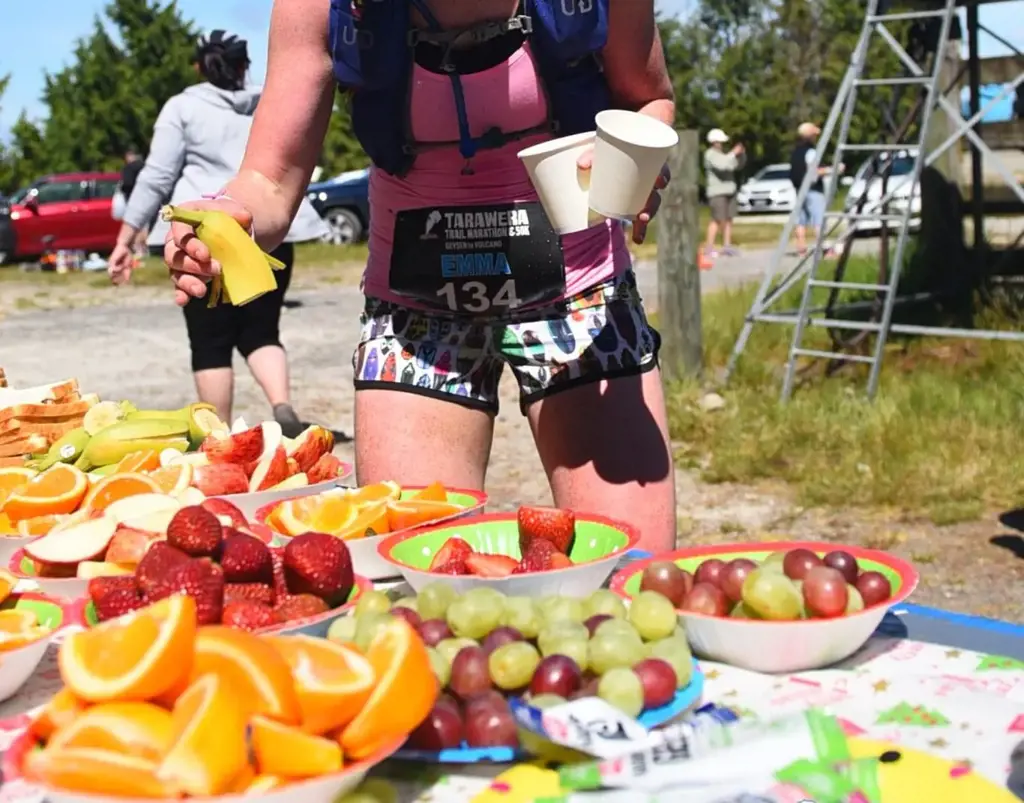
When it comes to preparing for a trail marathon, it's important to consider the type of food and hydration you pack for the race. Trail running requires a different level of endurance and sustenance compared to road running, as the terrain and elevation changes can be more challenging. Here are some tips on what kind of food and hydration to pack for a trail marathon.
Hydration:
Staying properly hydrated is crucial during a trail marathon. Make sure to carry a hydration pack or belt that allows you to have easy access to water or electrolyte-based drinks throughout the race. For longer trail marathons, consider packing a water filter or purification tablets to refill your water supply from natural sources along the way.
Electrolytes:
In addition to water, it's important to replenish electrolytes lost through sweat during a trail marathon. Electrolyte drinks, gels, or tablets can help maintain your body's electrolyte balance and prevent cramping or dehydration. Look for products that contain sodium, potassium, magnesium, and calcium.
Carbohydrates:
Carbohydrates are your body's primary fuel source during endurance activities like a trail marathon. Pack energy gels, chews, or bars that provide a mix of simple and complex carbohydrates to sustain energy levels throughout the race. Aim for products that contain a combination of glucose, fructose, and maltodextrin for a steady release of energy.
Protein:
While carbohydrates are important for immediate energy, packing some protein-rich snacks can help with muscle recovery and repair during a trail marathon. Consider carrying small portions of nuts, beef jerky, or protein bars to consume during longer breaks or at the end of the race.
Real Food:
Trail marathons often require hours of running, so it's important to pack real food that provides sustenance and satisfies hunger. Examples of suitable options include peanut butter and jelly sandwiches, wraps with turkey or ham, boiled eggs, or even small containers with cooked quinoa or rice mixed with vegetables. These items can provide a good balance of carbohydrates, proteins, and fats to keep you fueled and satisfied.
Experiment and Practice:
It's essential to experiment and practice with different types of food and hydration during your training runs to figure out what works best for you. Everyone's digestive system is different, so it's important to find the right balance of food and hydration that doesn't cause any stomach issues or discomfort during the race. Keep in mind that what works for one runner may not work for another, so try out different options to see what suits your body and energy needs.
Remember, the key is to pack a variety of food and hydration options that provide a mix of carbohydrates, electrolytes, proteins, and fats. Taking the time to plan and prepare your fueling strategy for a trail marathon will set you up for success and help you stay energized and hydrated throughout the race.
Essential Items to Pack for a Relaxing Sandals Vacation
You may want to see also

Are there any safety items or equipment that should be included in the packing list for a trail marathon?
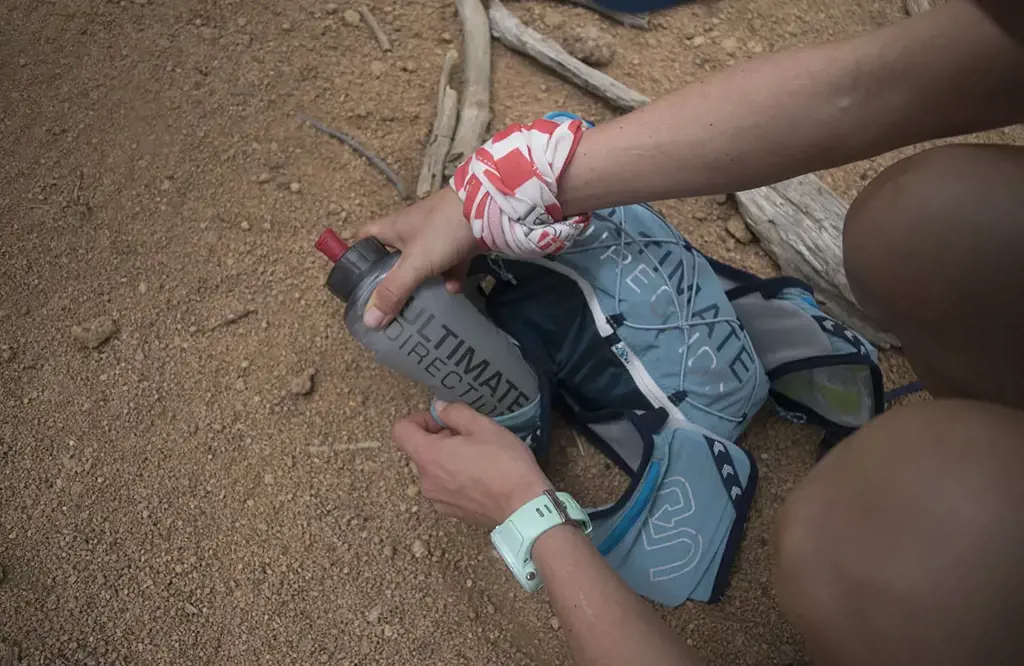
When preparing for a trail marathon, it is important to not only think about your running gear but also consider the safety items and equipment that should be included in your packing list. Trail running can present different challenges compared to road running, and being prepared for various situations can make a big difference in your race experience. Below are some safety items and equipment that you should consider including in your packing list for a trail marathon.
Water and Hydration Gear:
Staying hydrated is crucial during any endurance activity, and trail marathons are no exception. Make sure to pack a water bladder or bottles that can hold enough water to keep you hydrated throughout the race. Additionally, consider bringing a water filter or purification tablets if you'll be running in remote areas where water sources may be unreliable or contaminated.
Trail Map and Compass:
Even if the trail marathon is well-marked, it's always a good idea to have a trail map and compass with you. This can be helpful in case you get lost or if you need to take an alternative route due to an unexpected obstacle or closure. Familiarize yourself with the trail map before the race and practice using a compass if you're not already comfortable with it.
First Aid Kit:
Accidents can happen during a trail marathon, and having a basic first aid kit can help you handle minor injuries until medical help arrives. Your first aid kit should include items such as bandaids, adhesive tape, antiseptic wipes, gauze pads, blister patches, and pain relievers. Familiarize yourself with the contents of the kit and learn how to use them properly.
Headlamp or Flashlight:
If your trail marathon starts early in the morning or if there's a chance you'll be running into the evening, it's important to have a headlamp or flashlight with you. This will help you navigate the trail in low-light conditions and ensure your safety. Make sure to pack extra batteries and consider using a lightweight and waterproof headlamp or flashlight.
Cell Phone and Portable Charger:
Having a cell phone with you during a trail marathon can be indispensable in case of emergencies. Ensure that your phone is fully charged before the race, and consider bringing a portable charger or battery pack to keep your phone alive throughout the race. It's also a good idea to save important emergency numbers, race officials' numbers, and contact information for your support crew in your phone.
Whistle and Mirror:
A whistle and a signaling mirror can be useful tools to attract attention in case you get lost or need help. The whistle's sound can carry over long distances, alerting other trail users or race officials to your location. The signaling mirror can be used to reflect sunlight and catch someone's attention from a distance. These small and lightweight items can be easily attached to your pack or carried in a pocket.
Extra Clothing and Weather Protection:
Trail marathons can take place in various weather conditions, and it's important to be prepared for changes in weather. Pack extra layers of clothing, including a waterproof jacket, hat, and gloves, to keep you warm and dry in case of rain, wind, or dropping temperatures. Always check the weather forecast before the race and adjust your clothing accordingly.
Remember that these safety items and equipment are meant to enhance your safety on the trail, but they do not guarantee complete protection. It's also important to train appropriately for the trail marathon, have a race strategy, and follow any instructions or guidelines provided by the race organizers. By being prepared and mindful of your safety, you can have an enjoyable and successful trail marathon experience.
Essential Items to Pack as a Chaperone: A Comprehensive Guide
You may want to see also

Are there any optional items that could enhance the experience of running a trail marathon and should be considered when packing?
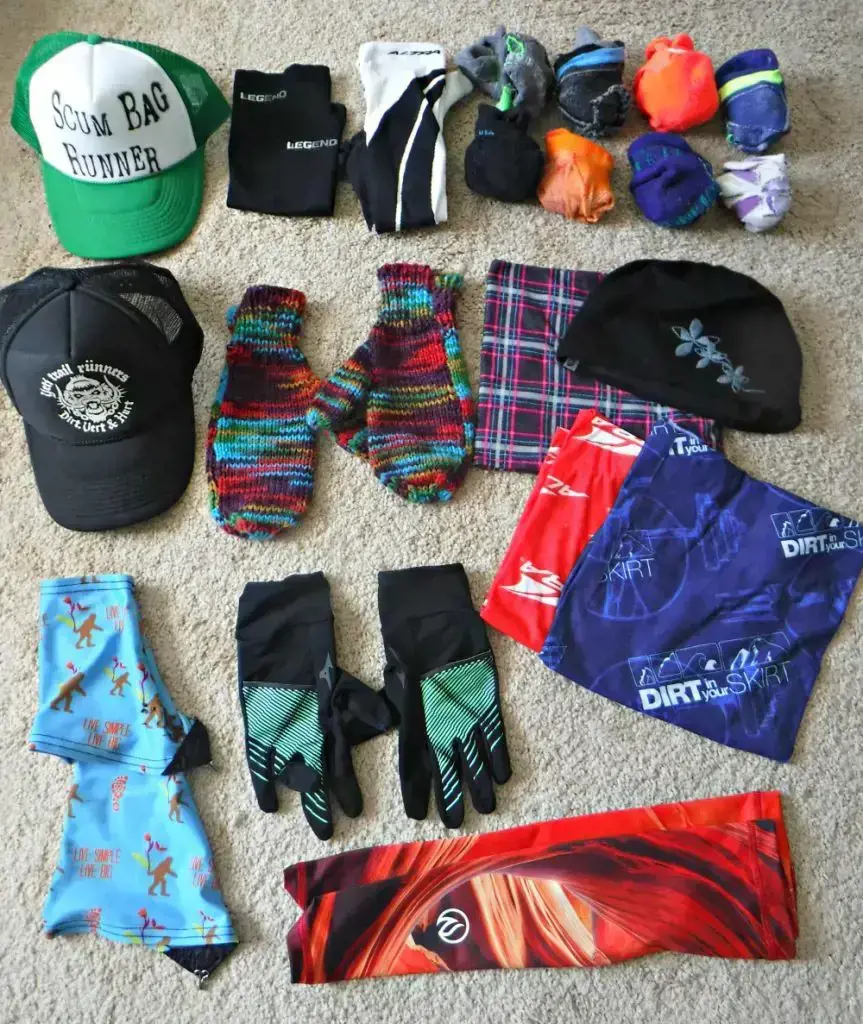
When preparing for a trail marathon, it's important to pack the essentials such as proper running attire, hydration, nutrition, and essential safety gear. However, there are also some optional items that can enhance your experience and make the race more enjoyable. Whether you're a novice or experienced trail runner, considering these additional items can boost your performance and comfort during the race.
- Trail Running Shoes: Investing in a good pair of trail running shoes is essential for running on rough and uneven terrain. These shoes provide extra traction, stability, and protection for your feet. Look for shoes with deep lugs for grip on muddy trails and a rock plate to protect your feet from sharp rocks. Ensure you break them in before the race to avoid blisters.
- Compression Gear: Compression socks or sleeves can provide support to your calves and reduce muscle fatigue during long runs. They enhance blood flow and can help speed up recovery post-race. Some runners also find them helpful in preventing muscle cramps and soreness.
- GPS Watch or Running App: Monitoring your pace and distance during a trail marathon is crucial. Investing in a GPS watch or using a reliable running app on your smartphone can help you track your progress, monitor your heart rate, and ensure you're staying on course. It can also provide motivation and help you determine if you need to adjust your pace or take breaks.
- Trail Gaiters: Gaiters are protective coverings that go over your shoes and lower legs to prevent debris such as rocks, dirt, and sand from getting into your shoes. They can be particularly useful during trail marathons where you're likely to encounter loose terrain and rough conditions. Gaiters can help keep your feet dry, clean, and blister-free.
- Lightweight Backpack or Hydration Vest: Proper hydration is essential during a trail marathon, especially if there are limited aid stations. Carrying a lightweight backpack or hydration vest allows you to bring your own water, electrolytes, and nutrition. Look for one with multiple pockets for easy access to essentials like energy gels, snacks, and sunscreen.
- Trekking Poles: In mountainous or hilly terrain, trekking poles can provide added stability, especially during steep ascents and descents. They can help reduce strain on your knees and provide additional support when navigating uneven trails. However, make sure you practice using them before the race to become comfortable with the technique.
- Body Glide or Anti-Chafing Cream: Running long distances can lead to chafing and blisters. Applying a body glide or anti-chafing cream to areas prone to friction, such as between thighs, underarms, or under sports bra straps, can help prevent discomfort and irritation. Look for products that are long-lasting and sweatproof.
- Portable Phone Charger: If you plan to use your smartphone for navigation, tracking, or staying connected during the race, it's essential to have a portable phone charger. Running apps and GPS tracking can drain your battery quickly, and having a backup power source ensures you stay connected throughout the race.
While these optional items can enhance your trail marathon experience, it's important not to overload yourself with unnecessary gear. Experiment with these items during your training runs to see what works best for you and ensures your comfort and performance on race day. Remember, each trail marathon is unique, so adapt your packing list to the specific demands of the race and your personal preferences.
The Essential Food and Snack Options for a Successful Soccer Tournament
You may want to see also
Frequently asked questions
When packing for your first trail marathon, it's important to consider the specific terrain and weather conditions. Essential items include a good pair of trail running shoes, a hydration pack or water bottle, a hat or visor to protect from the sun, sunscreen to prevent sunburn, and lightweight but warm layers for unexpected changes in weather.
Yes, it's always a good idea to pack some extra food or snacks for longer trail runs. Energy gels, protein bars, and fruits like bananas or oranges are great options to provide you with quick and long-lasting energy during the marathon. Make sure to pack foods that are easy to eat on the go and won't be affected by the heat or humidity.
The type of clothing you should pack will depend on the weather conditions and the duration of the marathon. In general, choose moisture-wicking and quick-drying materials that will help keep you comfortable and prevent chafing. A lightweight and breathable top, comfortable running shorts or leggings, and a windproof and waterproof jacket are usually good choices. Don't forget to pack extra socks and a change of clothes for after the race.
It's always important to prioritize safety during a trail marathon. Besides the essentials like a hydration pack or water bottle, consider packing a small first aid kit with items like band-aids, blister cushions, and pain relievers. Additionally, a whistle, a headlamp with extra batteries, a map or trail guide, and a fully charged cell phone with emergency numbers saved may also come in handy.
Apart from the basic essentials, there are a few other items that can enhance your race experience. These include a foam roller or massage stick to help with post-race recovery, a hat or bandana to keep sweat out of your eyes, sunglasses to protect your eyes from the sun and debris, and a small towel or hand sanitizer for personal hygiene. Additionally, don't forget to pack your race bib, timing chip, and any race-specific items provided by the organizers.







